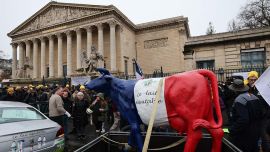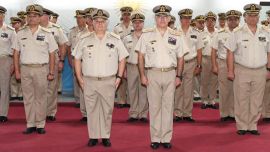Former Rosario Central and Racing Club coach Eduardo Coudet is known for his distinctive style of dress. Seemingly always battling against the cold, even during the heights of the Argentine summer, Chacho donned a lucky scarf throughout Racing's successful quest for the Superliga title in 2019, eventually giving away the snug item of clothing in the middle of celebrations after clinching the crown against Tigre.
On Wednesday, however, the trainer was sporting a rather different look. Coudet donned a red face mask as well as a thick jacket, as he oversaw Brazilian side Internacional's first training session since the outbreak of coronavirus. Brazil may be in chaos over the pandemic, with confirmed cases and deaths increasing at a dizzying rate, but unlike its neighbours the nation is in a hurry to get back to 'normal' – and that, of course, has to include O Jogo Bonito.
“We have put together a protocol based on players' safety,” the Porto Alegre club's medical coordinator, Luiz Crescente, explained in a statement that accompanied the resumption of practices. “We have supplied open-air tents, where we carry out medical evaluations looking for possible symptoms.”
As well as Coudet, the likes of Andres D'Alessandro, Victor Cuesta and Renzo Saravia went through the motions in reduced training groups and every Inter player and employee was tested for the virus. The outbreak interrupted Rio Grande do Sul's Gaucho State Championship, and the hope is that the competition will soon be able to resume if clubs are able to prevent Covid-19 from spreading.
In a country as vast as Brazil, with such disparities in healthcare and infrastructure from region to region, coordinating any type of nationwide return is likely to prove near-impossible. While Inter were being put through their paces, up in Rio de Janeiro, one of the worst-hit areas, no less than 38 cases were diagnosed at Flamengo, reigning Brazilian and South American champions, including three members of the first-team squad.
On Thursday, Rio resorted to placing barricades in the streets in order to stop people congregating, a sign of the conflict between local officials hoping to avoid further disaster as Brazil nears 10,000 fatalities from the illness, and President Jair Bolsonaro's cavalier flouting of social distancing measures and calls for supporters to do the same. Against such a dysfunctional backdrop, it is difficult to see football returning to either Rio or the similarly ravaged São Paulo states any time in the near-future.
Thankfully for the Argentine public, kamikaze attitudes like Bolsonaro's remain firmly in the minority, with the national and Buenos Aires City governments continuing to lean towards caution, even as they prepare to gradually ease quarantine measures. Football remains a distinctly secondary concern, as Tourism & Sports Minister Matías Lammens recognised on Thursday.
“A scenario where football could come back still feels far away,” the minister explained to Radio Continental. “Aside from whatever decision we make alongside health authorities, the teams are not even training. I will most likely have a meeting soon with the health minister to work on protocols; not just for football but for other sports that want to resume.”
Any return to action, Lammens added, would be accompanied by the provision of supplies for mass testing and would initially at least be behind closed doors, with fans banned from attendance. No possible return date has been mentioned, however, which feels like the most sensible approach at a time when the dilemma of both keeping infections to a minimum and beginning to breathe life again into Argentina's spluttering economy are the government's key priorities. No rushed calls will be made that risk further misery; and given the harrowing scenes filtering down from Argentina's neighbour to the north, that is no bad thing.



















Comments